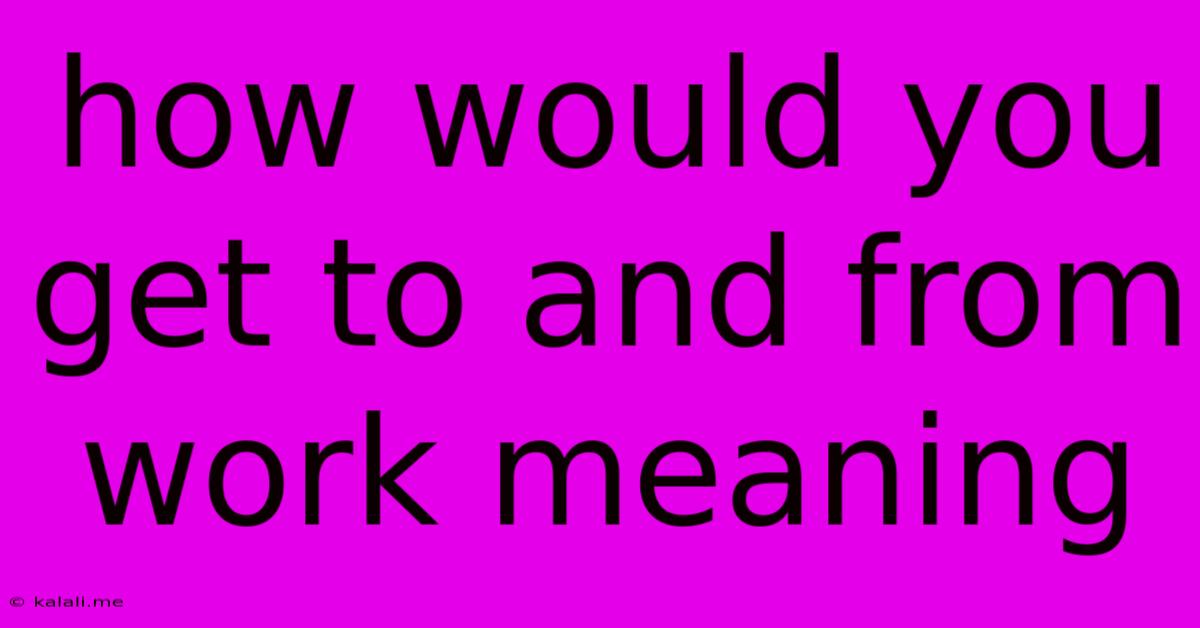How Would You Get To And From Work Meaning
Kalali
May 19, 2025 · 3 min read

Table of Contents
How Would You Get to and From Work? Decoding the Interview Question
The seemingly simple interview question, "How would you get to and from work?", is a subtle probe into far more than just your commute. It assesses your organizational skills, your problem-solving abilities, your reliability, and even your understanding of the company culture. This article will dissect this common interview question and provide strategies for crafting a compelling and insightful answer.
Why Recruiters Ask This Question
At first glance, this question seems trivial. However, recruiters aren't just interested in your mode of transportation. They're looking for evidence of:
- Punctuality and Reliability: Can you consistently arrive on time? Do you have a backup plan for unforeseen circumstances?
- Planning and Organization: Do you plan ahead? Are you proactive in anticipating potential problems with your commute?
- Commitment to the Job: Is the job important enough to you to make necessary arrangements for reliable transportation?
- Understanding of the Work Environment: Does your chosen method of transportation align with the company culture (e.g., a formal office environment might discourage cycling in casual attire)?
- Adaptability: Are you flexible enough to adjust your commute if necessary?
Crafting Your Answer: A Step-by-Step Guide
Here's how to structure your response to make a positive impression:
-
State Your Primary Method of Transportation: Be clear and concise. "I plan to drive to work," or "I will commute by public transportation," are perfectly acceptable starting points. Specify the route if relevant.
-
Highlight Your Backup Plan: This is crucial. Unexpected events happen – traffic jams, train delays, car trouble. Show your preparedness:
- Driving: "In case of unforeseen traffic, I have mapped out alternate routes using navigation apps and allow extra time for potential delays."
- Public Transportation: "I'm familiar with the various public transportation options and have alternative routes planned in case of service disruptions."
- Cycling/Walking: "I've considered potential weather conditions and will adjust my commute accordingly, potentially using public transport as a backup if necessary."
-
Address Potential Challenges (Proactively): Anticipating and addressing potential obstacles demonstrates foresight. For example:
- "While parking can be challenging in the area, I've researched parking options and secured a spot near the office."
- "I'm aware of rush hour traffic and have factored in additional commute time to ensure punctual arrival."
-
Connect to the Company Culture (if applicable): If you're aware of the company's emphasis on sustainability, mention environmentally friendly options: "I'm considering cycling or using public transport to reduce my carbon footprint, aligning with the company’s commitment to environmental responsibility."
-
Keep it Concise and Professional: Avoid overly detailed or irrelevant information. Focus on the key points: your primary mode of transport, your backup plan, and your preparedness for potential challenges.
Examples of Strong Answers:
- "I plan to drive to work, utilizing [Name of Navigation App] to navigate and account for potential traffic delays. As a backup, I've researched alternative routes and public transport options in case of unexpected car trouble."
- "I will be using the subway to commute. I'm familiar with the subway system and have identified alternative routes in case of service disruptions or delays. I will also allow extra time to account for any unexpected situations."
- "I plan to cycle to work, weather permitting. However, I have access to a reliable carpooling arrangement with a colleague as a backup for inclement weather."
Conclusion
The "How would you get to and from work?" question is a valuable opportunity to showcase your organization, planning, and problem-solving skills. By thoroughly preparing a detailed yet concise answer, you can impress the interviewer and demonstrate your suitability for the role. Remember to be honest, proactive, and highlight your preparedness to navigate potential commute challenges.
Latest Posts
Latest Posts
-
Is Toothpaste A Liquid Or A Solid
May 20, 2025
-
A Form Of Leather That Was Popularised By Native Americans
May 20, 2025
-
How To Stop Pasta Sticking Together When Cold
May 20, 2025
-
How Do You Say Have A Good Day In Spanish
May 20, 2025
-
Can You Square Root A Negative Number
May 20, 2025
Related Post
Thank you for visiting our website which covers about How Would You Get To And From Work Meaning . We hope the information provided has been useful to you. Feel free to contact us if you have any questions or need further assistance. See you next time and don't miss to bookmark.